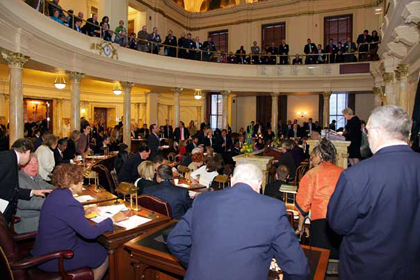
Bills Provide Various Measures To Stimulate Economy and Create Jobs
TRENTON – Several pieces of legislation sponsored by Senators Fred Madden (D-Gloucester, Camden) and Paul Sarlo (D-Bergen, Essex, Passaic) were approved today by the full Senate. The bills would help promote higher education and business partnerships, create tax credits for angel investors, and provide financial resources for economic development projects.
The first bill, S-2398, would direct the New Jersey Economic Development Authority and the state Commission on Higher Education to work to bring together business and the state’s colleges and universities for joint research and development ventures. Madden said such ventures would be especially valuable in the research-driven technology and life-sciences industries.
“New Jersey’s businesses should be able to tap into the power of our higher education community,” said Madden. “We already are home to some of the world’s leading academic research facilities, so pairing our colleges and universities with high-tech companies can be a win-win situation.”
“Having our state’s institutions of higher learning and our business community come together is a common-sense measure that can help spur innovation and, in turn, economic growth,” said Sarlo. “The ability of these two groups to work in conjunction with one another will provide both the jobs and the technology this state needs to progress.”
It also is sponsored by Senate Majority Leader Barbara Buono (D-Middlesex).
The second Madden/Sarlo bill, S-2454, also known as the “New Jersey Angel Investor Tax Credit Act”, would create specific gross income and corporate business tax credits for start-up investments of up to $500,000 made in New Jersey-based high-tech and biotechnology companies. So-called “angel investors” are individual entrepreneurs who provide the massive capital investments that start-up technology businesses need to get up and running.
“Equity investors are crucial to providing the needed capital that helps spur high tech businesses and create new and world-changing technologies,” said Madden. “By offering direct credits to individuals and businesses, we will be providing one more incentive to keep and bring companies to New Jersey.”
“Angel investors are in many ways the backbone behind technologically based business and innovation,” said Sarlo. “We must be doing everything we can to encourage these kinds of individuals and groups to support and provide for New Jersey businesses. This bill will be an important step in doing so.”
The third bill, S-2545 – also sponsored by Senator John Girgenti (D-Passaic, Bergen) – would establish the “New Jersey Closing Fund” under the jurisdiction of the State Treasurer and administered by the New Jersey Economic Development Authority (EDA). The fund would stimulate economic activity by encouraging and promoting the retention and expansion of existing business and industry within New Jersey, and by creating and attracting new business and industry to the state. The bill would authorize the Treasurer to grant an award under the fund to projects that will significantly benefit New Jersey and that require additional resources as an inducement to locate or remain in the state.
“Improving the business climate of our state is crucial to helping those who are currently unemployed or underemployed,” said Madden. “The ‘Closing Fund’ will create a friendly business climate in the state and encourage businesses to come here and stay here”.
“In order to get the economy moving, we not only have to attract businesses to New Jersey, but we must also do our best to maintain those that are already here,” said Sarlo. “This fund will do that. We have also made sure that the Joint Budget Oversight Committee would have 30 days to review any recommendations of funded projects made by the Treasurer. This will ensure legislative oversight over the commitment of taxpayer dollars.”
The bill would limit the total amount of funds that can be awarded to no more than $50 million in one fiscal year. Individually, an award issued could not exceed $1 for every $4 of private capital investment in an approved project by the applicant or any of its affiliates.
The legislation now heads to the Governor’s desk.

